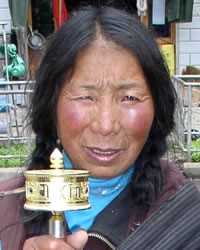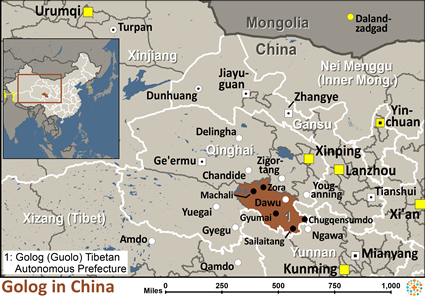The Golog are the descendants of Tibetan warriors sent to guard the northern borders. "In the seventh century AD, the Tibetan king dispatched his fiercest warriors, ancestors of the present-day Gologs and neighboring Khampas, to guard the country's mountainous northern frontier against Chinese invasion. When the Tibetan kingdom eventually collapsed, the Gologs stayed in their mountain retreat, defiant of outside authority." A Chinese historian states, "Tibetan tribes from the Upper, Middle and Lower Golog all can trace their roots to Baima. Baima County is situated on the southeast tip of Qinghai and borders on Sichuan."
According to one source, Golog means "those with heads on backwards." This name comes from their reputation for being an extremely stubborn and rebellious people.
The Golog language is "largely unintelligible to most Tibetans." There are numerous dialects and local varieties spoken by dozens of different Golog tribes and clans.
The nomadic Golog wear greasy sheepskins, yak-hide boots, and felt bowler hats, a lasting legacy of the British invasion of Tibet in the early 1900s. Many wild animals inhabit the Golog region, including "blue sheep, gazelles, bears, wolves, and deer."
All Gologs are Tibetan Buddhists. Many Golog women have 108 braids of hair, considered an auspicious number by Tibetan Buddhists.
Few Golog have ever heard of Jesus Christ or his offer of salvation. They have been separated from all outside influence, including Christianity, for centuries. "[Gologs] live here, and other tribes of Tibetans, with whom they quarrel and fight. Yet of these local wars, not even an echo ever reaches the outside world." In the early part of the twentieth century, some missionaries passed through the Golog area and distributed gospel literature, receiving an interested response from one Golog Head Lama. In recent years at least one mission agency has expressed interest in reaching the Gologs.
Without the guidance of Christ, these people will be lost in this life and the life to come. They need someone to go to them as Christ-bearers.
Pray for the Lord to intervene in their families, calling people to his side.
Pray for loving, anointed workers.
Pray for their hearts to be drawn to the Lord of lords.
Pray for a church planting movement to thrive in their communities.
Scripture Prayers for the Golog in China.
Operation China, Asia Harvest, Copyrighted © Used with permission
Groma in China
https://joshuaproject.net/people_groups/11946/CH
| Profile Source: Joshua Project |

























